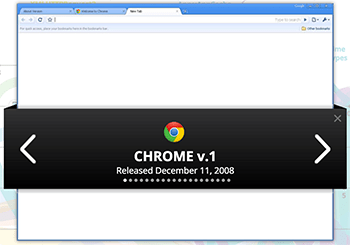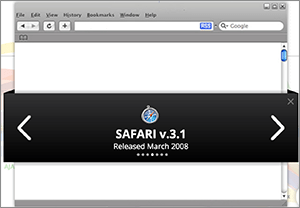Posted on Thursday, April 30th, 2015 by Will Hagle
 The Evolution of the Web is an innovative visualization that tells the history of web browsers and technologies.
The Evolution of the Web is an innovative visualization that tells the history of web browsers and technologies.
 The Evolution of the Web presents a visual timeline of the history of the web browser and related technologies. It begins in 1991 with HTTP and HTML 1, and then it marks the invention of early browsers like Mosaic and Netscape. By clicking on icons of each browser, you can explore images that depict the evolution of the individual browsers. It’s interesting to see how each company’s browser changed and evolved over the years (and how similar the modern browser looks to Mosaic’s 1992 edition). The timeline progresses to 2012, showcasing all of the languages and browsers that were invented along the way. It ends with the invention of Chrome, which may have been given some preference considering the credits claim the site was “made with some friends from the Google Chrome team.”
The Evolution of the Web presents a visual timeline of the history of the web browser and related technologies. It begins in 1991 with HTTP and HTML 1, and then it marks the invention of early browsers like Mosaic and Netscape. By clicking on icons of each browser, you can explore images that depict the evolution of the individual browsers. It’s interesting to see how each company’s browser changed and evolved over the years (and how similar the modern browser looks to Mosaic’s 1992 edition). The timeline progresses to 2012, showcasing all of the languages and browsers that were invented along the way. It ends with the invention of Chrome, which may have been given some preference considering the credits claim the site was “made with some friends from the Google Chrome team.”
 The Evolution of the Web isn’t the prettiest site to look at, but it does use colors and visuals in an interesting and informative way. Each language on the time line is connected by a thread with a unique color. You can follow those threads to see how the languages changed in popularity and use over time, as well as how they were integrated into various browsers. The Evolution of the Web site also contains another interactive infographic, called “The Growth of the Internet.” That timeline depicts the amount of global Internet users alongside the amount of global Internet traffic in petabytes per month. As you might predict, both have been steadily increasing since the early 1990s. For more insight into the history of browsers and related technologies, the Evolution of the Web is a must-visit.
The Evolution of the Web isn’t the prettiest site to look at, but it does use colors and visuals in an interesting and informative way. Each language on the time line is connected by a thread with a unique color. You can follow those threads to see how the languages changed in popularity and use over time, as well as how they were integrated into various browsers. The Evolution of the Web site also contains another interactive infographic, called “The Growth of the Internet.” That timeline depicts the amount of global Internet users alongside the amount of global Internet traffic in petabytes per month. As you might predict, both have been steadily increasing since the early 1990s. For more insight into the history of browsers and related technologies, the Evolution of the Web is a must-visit.


